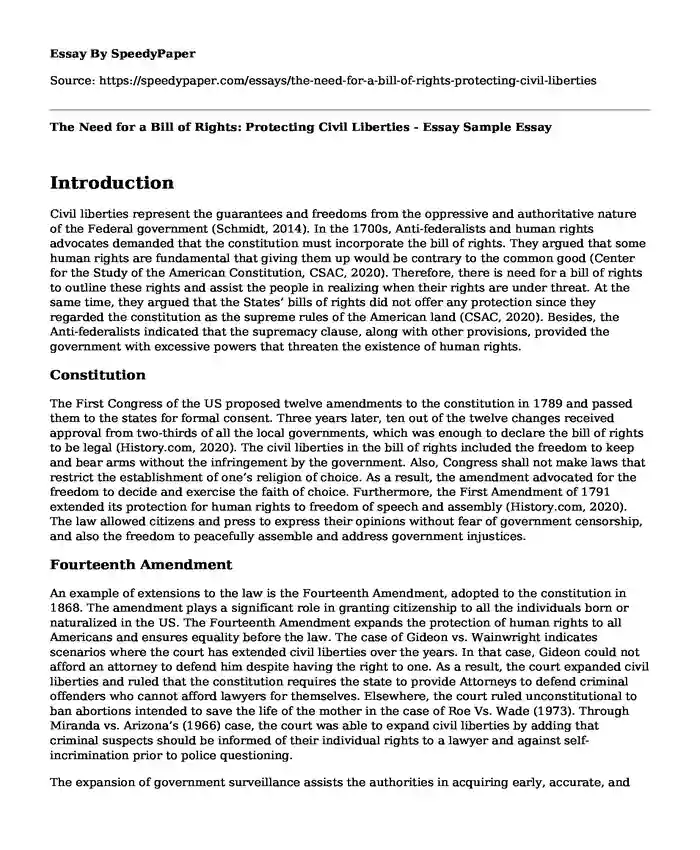
| Type of paper: | Essay |
| Categories: | Law Human rights |
| Pages: | 3 |
| Wordcount: | 661 words |
Introduction
Civil liberties represent the guarantees and freedoms from the oppressive and authoritative nature of the Federal government (Schmidt, 2014). In the 1700s, Anti-federalists and human rights advocates demanded that the constitution must incorporate the bill of rights. They argued that some human rights are fundamental that giving them up would be contrary to the common good (Center for the Study of the American Constitution, CSAC, 2020). Therefore, there is need for a bill of rights to outline these rights and assist the people in realizing when their rights are under threat. At the same time, they argued that the States’ bills of rights did not offer any protection since they regarded the constitution as the supreme rules of the American land (CSAC, 2020). Besides, the Anti-federalists indicated that the supremacy clause, along with other provisions, provided the government with excessive powers that threaten the existence of human rights.
Constitution
The First Congress of the US proposed twelve amendments to the constitution in 1789 and passed them to the states for formal consent. Three years later, ten out of the twelve changes received approval from two-thirds of all the local governments, which was enough to declare the bill of rights to be legal (History.com, 2020). The civil liberties in the bill of rights included the freedom to keep and bear arms without the infringement by the government. Also, Congress shall not make laws that restrict the establishment of one’s religion of choice. As a result, the amendment advocated for the freedom to decide and exercise the faith of choice. Furthermore, the First Amendment of 1791 extended its protection for human rights to freedom of speech and assembly (History.com, 2020). The law allowed citizens and press to express their opinions without fear of government censorship, and also the freedom to peacefully assemble and address government injustices.
Fourteenth Amendment
An example of extensions to the law is the Fourteenth Amendment, adopted to the constitution in 1868. The amendment plays a significant role in granting citizenship to all the individuals born or naturalized in the US. The Fourteenth Amendment expands the protection of human rights to all Americans and ensures equality before the law. The case of Gideon vs. Wainwright indicates scenarios where the court has extended civil liberties over the years. In that case, Gideon could not afford an attorney to defend him despite having the right to one. As a result, the court expanded civil liberties and ruled that the constitution requires the state to provide Attorneys to defend criminal offenders who cannot afford lawyers for themselves. Elsewhere, the court ruled unconstitutional to ban abortions intended to save the life of the mother in the case of Roe Vs. Wade (1973). Through Miranda vs. Arizona’s (1966) case, the court was able to expand civil liberties by adding that criminal suspects should be informed of their individual rights to a lawyer and against self-incrimination prior to police questioning.
The expansion of government surveillance assists the authorities in acquiring early, accurate, and real-time information to prevent terrorism activities before they happen. However, the strategy invades people’s privacy and places innocent civilians under investigation. But, reducing civil liberties is not a solution to national security since the approach only jeopardizes the existence of ordinary civilians (majorities) in a free and equal world. Elsewhere, I believe that the civil liberty of free speech allows the corporation to use unlimited funds to express their political views, including funding campaigns. However, this is a threat to democracy since excessive funds can tamper with the actual opinions of the people.
References
History.com. (2020). Bill of rights passes Congress. https://www.history.com/this-day-in-history/bill-of-rights-passes-congress
Center for the Study of the American Constitution, CSAC. (2020). The debate over a bill of rights. The University of Wisconsin-Madison. https://csac.history.wisc.edu/document-collections/constitutional-debates/bill-of-rights/
Schmidt, C.W. (2014). The civil rights and civil liberties divide. Chicago-Kent College of Law, 1-28. https://scholarship.kentlaw.iit.edu/cgi/viewcontent.cgi?article=3365&context=fac_schol
Cite this page
The Need for a Bill of Rights: Protecting Civil Liberties - Essay Sample. (2023, Sep 11). Retrieved from https://speedypaper.net/essays/the-need-for-a-bill-of-rights-protecting-civil-liberties
Request Removal
If you are the original author of this essay and no longer wish to have it published on the SpeedyPaper website, please click below to request its removal:
- Why Media Portray African-American Males as Criminals - Paper Example
- Essay Sample: Effects of Marijuana Legalization in Colorado
- Free Essay Sample on Marijuana and Canadian Workplace
- Civil Disorder During Corona Virus Pandemic - Free Essay
- Essay Example on Criminal Law: Serial Offenders
- Cyntoia Brown: A Critique of the Juvenile Justice System - Paper Example
- Ethics Discretion and Decision Making - Paper Sample
Popular categories




